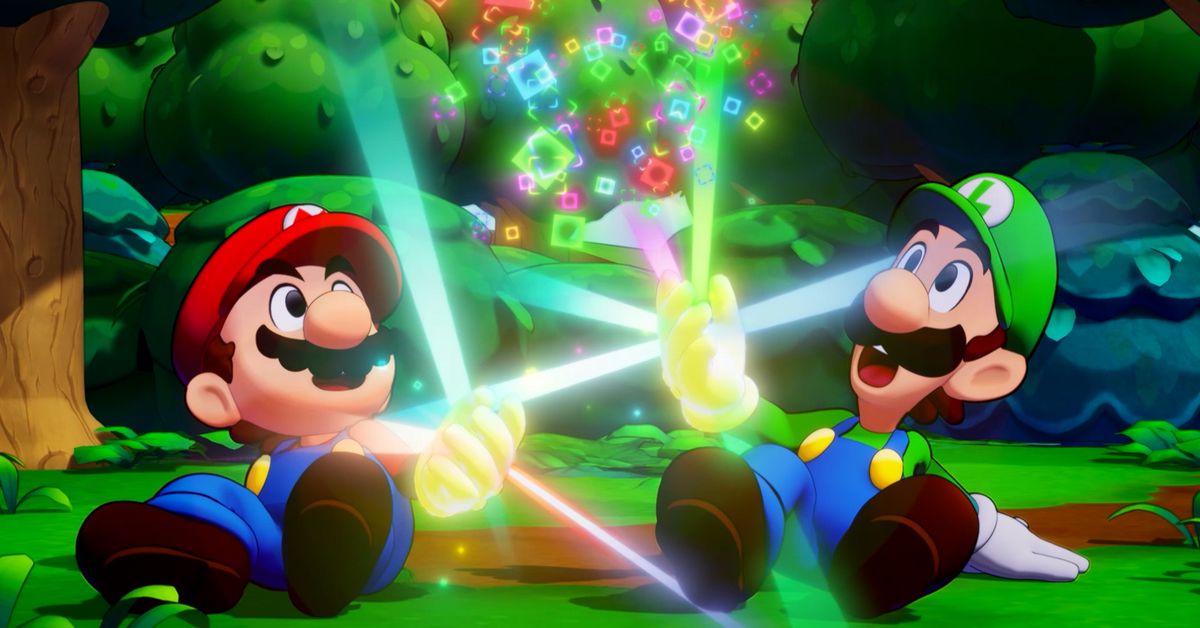/cdn.vox-cdn.com/uploads/chorus_asset/file/25713430/Switch_Mario_LuigiBrothership_scrn_24.jpg)
Brothership, once again, starts with the brothers getting whisked away to a fantasy realm in need of help. This time it’s the oceanic world of Concordia, which has been broken apart into a series of islands. The bros end up in a place called Ship Shape Island, a name that’s a bit of a misnomer. While it’s technically an island, it’s also a ship, a floating city like something out of Waterworld. Soon they learn that they need to find the other broken-off pieces of Concordia and literally tether them back to Ship Shape, thus putting the world back together again. Also, for some reason, almost everyone in this world has a power socket for a face.
It’s weird, but things start out simple enough, as you have to pilot the seas to find each island, and then travel to them by firing yourself out of a cannon. There’s an overarching plot about an important lighthouse, a revered tree, and some evil electrical components, but Brothership has the most personality when you visit each of the disparate islands to solve their particular problems before connecting them.
What has always separated the Mario RPGs — aside from all of the Nintendo trappings — is their sense of humor. These games are funny. And Brothership is just as goofy as its contemporaries, with communities suffering from chronic hair gel shortages and characters that include a floating pig (who definitely isn’t a pig) and an old turnip who gives terrible advice and makes even worse puns.
That sense of playfulness extends to the gameplay. Brothership is a turn-based RPG with some light platforming and puzzle-solving. The battles, like the rest of the Mario & Luigi series, are based on timing; you have to hit a button at just the right time to get the most out of an attack. The timing varies whether you’re stomping on a bad guy’s head, smacking them with a hammer, or firing a Koopa shell in their direction, and the brothers can work together on most attacks. This means that, unlike most turn-based RPGs, you aren’t simply selecting actions from a menu. You have to be more involved even for the simpler battles.
This was all true of past games, and so initially Brothership can feel very familiar. But a few hours in it starts to open up with some clever role-playing features. Most notable is something called “plugs,” which are essentially buffs or actions that you can craft and then equip. These do everything from let the brothers heal automatically without using a turn, to increasing your attacks against flying enemies. There are a bunch, so you can really customize your bros, but the twist is that each plug can only be used a certain number of times before it has to recharge for a while. This forces you to experiment and think about what bonuses you want to use and when.
The other major new feature is also my favorite: Luigi logic. The idea is that, at key moments in the game, Mario’s brother will use his unique brain to find a solution to a particular problem. This could mean finding a strange way to navigate an obstacle or a weird new attack to down a boss. You don’t have any control over these ideas, but they’re very funny, and go a long way towards building out the goofy vibe that makes these games so charming. For once, Luigi is bumbling in a way that’s actually helpful.
Mario & Luigi: Brothership launches on November 7th on the Nintendo Switch.
Services Marketplace – Listings, Bookings & Reviews
